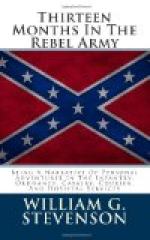We reached Chattanooga on June 1st, and I found it, to my chagrin, a military camp, containing 7,500 cavalry, under strict military rule. We were now in a trap, as our pass here ended, and we were near the Federal lines. How to get out of the town was now the problem, and one of the most difficult I had yet met in my study of Rebel topography. We put up at the Crutchfield House, stabled our horses, and sat about in the bar-room, saying nothing to attract attention, but getting all the information possible. I was specially careful not to be recognized. The cavalry company I had commanded on the long retreat from Nashville, was in Chattanooga at this time. Had any one of them seen me, my position would have been doubly critical; as it was, I felt the need of circumspection. It was clear to me that we could not leave Chattanooga in military garb, as we had entered it, for, without a pass, no cavalryman could leave the lines. This settled, a walk along the street, showed me a Jew clothing-store, with suits new and old, military and agricultural. My resolution was formed, and I went to the stable, taking with me a newly fledged cavalry officer, who needed and was able to pay for an elegant cavalry saddle. Being “hard up” for cash, I must sell: and he flush of money and pride, must buy. Thus I was rid of one chief evidence of the military profession. A small portion of the price purchased a plain farmer-like saddle and bridle. An accommodating dealer in clothes next made me look quite like a country farmer of the middle class. My companion was equally successful in transforming himself, and in the dusk of the evening we were passing out to the country as farmers who had been in to see the sights.
We safely reached and passed the outer pickets, and then took to the woods, and struck in toward the Tennessee river, hoping to find a ferry where money, backed, if necessary, by the moral suasion of pistols, would put us across. I was growing desperate, and determined not to be foiled. We made some twelve miles, and then rested in the woods till morning, when selecting the safest hiding-place I could find, I left my companion with the horses and started out on a reconnoissance.
Trudging along a road in the direction of the river, I met a guileless man who gave me some information of the name and locality of a ferryman, who had formerly acted in that capacity, though now no one was allowed to cross. Carefully noting all the facts I could draw out of this man, I strolled on and soon fell in with another, and gained additional light, one item of which was that the old “flat” lay near, and just below, the ferryman’s house. Thus enlightened, I walked on and found the house and my breakfast. Being a traveler, I secured without suspicion sandwiches enough to supply my companion with dinner and supper, which he enjoyed as he took care of the horses in the woods. A circuitous route brought me to them, and I was pleased to see the horses making a good meal from the abundant grass. This was an important point, as our lives might yet depend upon their speed and endurance.




